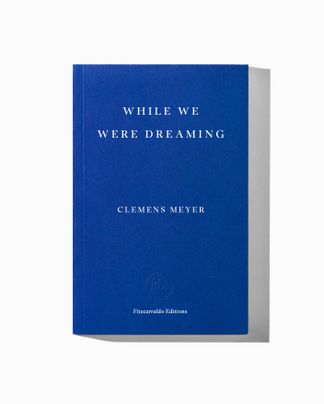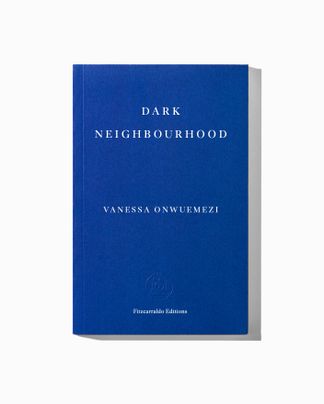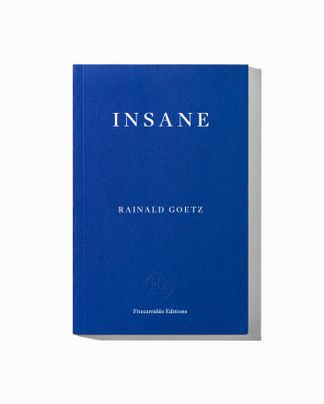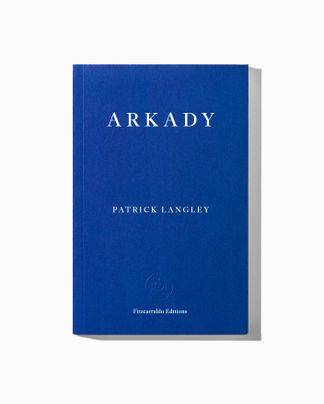International Booker-longlisted author Clemens Meyer returns with Dark Satellites, a striking collection of stories about marginal characters in contemporary Germany. A train driver’s life is upended when he hits a laughing man on the tracks on his night shift; a lonely train cleaner makes friends with a hairdresser in the train station bar; and a young man, unable to return to his home after a break-in, wanders the city in a state of increasing unrest. From the home to places of work, Meyer transforms the territories of our everyday lives into sites of rupture and connection. Unsentimental and yet deeply moving, Dark Satellites is a collection of stories from our time, as dark as the world, as beautiful as the brightest of hopes.
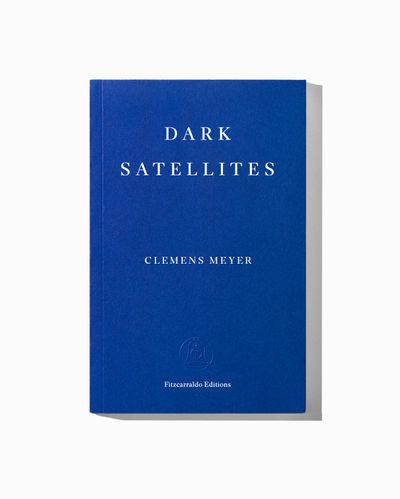
Dark Satellites
Translated by Katy Derbyshire
French paperback with flaps, 224 pages
Published 20 January 2020
Dark Satellites
Translated by Katy Derbyshire
BROKEN GLASS IN UNIT 95
The nights were dull and endless, started at six and ended at six, they were like dark days that touched in the middle, and when they stopped being dull they got even darker and more endless and we wished we were bored again, hours half-asleep between our inspection rounds, our heads never allowed to touch the table top, we’d doze sitting up, but Unit 95 had become unpredictable and some of us had got unpredictable too and lost our nerve and got taken off the job, but I tried to stay calm, I knew the new part of town, the satellite town where Unit 95 was, I knew the nights when people went crazy, I’d been working in Unit 95, been doing my rounds all over town since the mid-nineties, I knew the hostels the other guys sometimes called ‘roach motels’, where the asylum-seekers lived, no one had ever liked working shifts there, and now it was all getting even worse.
Some of the old guys at work said: It’s all starting over again. And they were right, I remembered the time and the nights when it was dangerous and there was no counting on the police, ‘the pigs’ as we called them back then. It seemed a long time ago, seemed a long way away, and then I realized I was an old guy as well.
Unit 95 was in the middle of the 1970s blocks and the new high-rises of the satellite town.
The blocks from the seventies had all been done up, their once-grey concrete walls decorated with brightly coloured shapes and patterns, and by day I saw a lot of the pensioners who lived there looking out of the windows when the weather was good, their arms resting on cushions, though there wasn’t much to see in the satellite town or in Unit 95.
But there was the refugees’ reception centre. Some of the guys at work said Unit 95 was the reception centre, the ‘RC’, but that wasn’t right.
Unit 95 was a square of ten-storey concrete blocks, a large courtyard between the blocks, and the RC a bit further outside the square; a property company had bought it all and done it up years ago, and now someone had to look after it, the nights were long in the satellite town, and as usual they wanted to save money and had signed up one of the cheapest security firms even though the reception centre was part of the package they’d bought from the council. I don’t want to put us down, we were a good team, cheap but good, and at least some of the guys knew what they were letting themselves in for when they put on the uniform.
I started my round without the dog, like I always did. It was still almost light and the dog had hip problems like most of the work dogs, he was an old Belgian Shepherd, well trained but with a slight limp, the onset of HD, hip dysplasia, and I didn’t take him on my round until after midnight. He stayed in the security cabin until then and rested. Our cabin was right next to the road on a grass verge and the light was on from six till six – you couldn’t turn it off – so everyone could see us. A security guy and a dog in a glowing Plexiglas cabin, and outside, the night.
‘One to Twelve, One to Twelve, come in, over.’ I unclipped the radio from my belt. It was heavy and much too large and a better weapon than the rubber baton I also wore on my belt. The radio was a relic from another era, we had mobiles and smartphones and all that crap, but the radio sent out beeps and white noise in the frequencies of the night, it spoke to us through time and space as I saw her again that night in Unit 95.
But it wasn’t her. How could it be her, unchanged and so young, after more than twenty years?
‘Twelve, go ahead.’
I started my first round without the dog. It was autumn. I touched the first magnetic tag against my guard patrol reader. A low beep. I put the black device back into the side pocket of my uniform jacket; it looked like an electric shocker. The walkie-talkie crackled and began to speak, and I heard the voice of the old dispatcher back at base, far away from the satellite town, on the western edge of the town proper, out of which the satellite town grew like… days that… I shook my head, too many rounds, too many shifts over the past few weeks.
‘One calling Twelve,’ came the dispatcher. We’d been waiting years for him to retire. They said he used to be a big gun in the secret service but ever since I’d known him, since I started working for the security firm, he’d looked like an old man.
‘Twelve, go ahead.’
‘All quiet in Unit 95, over?’
‘Expecting something?’ I asked into the radio and walked to the next checkpoint, fixed to a wall a few buildings along, next to a children’s playground. There were two children playing there even though it was almost dark. They looked like they’d come over from the RC, straight black hair, dark skin, they usually came to play in the evening once the other children had gone. My patrol reader beeped quietly as I touched it to the magnetic tag. The two children sat down on the sand under the climbing frame and held hands. And they sat there, hand in hand.
(…)
Read Clemens Meyer’s short story ‘Late Arrival’ on Granta
Spectator Books of the Year 2020
‘Figures from society’s margins are at the centre of the stories…. Dark Satellites throws a perceptive light on circumscribed lives on the edges of Europe.’
— David Mills, The Sunday Times
‘Clemens Meyer’s great art of describing people takes the form of the Russian doll principle: a story within a story within a story. From German jihad to a Prussian refugee drama, so much is so artfully interwoven that his work breaks the mould of the closed narrative. Images of history extending into the present are what make this collection a literary sensation.’
— Katharina Teutsch, Die Zeit
‘Dark Satellites proves once again that he is one of the strongest German writers. His short stories possess depth and truth, linking East German history with the present and painting dense and perceptive portraits of what we call “common people” – without a trace of mawkishness or kitsch.’
— Heinrich Oemsen, Hamburger Abendblatt
‘[Meyer’s] stripped-back prose is suffused with meaning.’
— The Arts Desk
‘Meyer’s writing is brittle, laconic, clear, intense – and once again on top form. Short stories are clearly his forte. He finds memorable images for his themes: a dance without music in an unused Russian canteen; a midnight haircut; a man who slides into another identity after a break-in to his home and leaves his briefcase, the last requisite of his old life, in an abandoned shop. Meyer’s stories are quiet, tragic and once again populated by ordinary people, for whom he has always harboured sympathies.’
— Steffen Roye, Am Erker
‘Meyer’s snapshots of urban life – a burger bar, a fairground wheel, a neglected train station – are so vivid they make you see your own surroundings in the light of those faraway buildings.’
— Anna Aslanyan, Spectator
‘At their most effective, these stories conjure a sense of historical displacement and complex German identity…. Our remaining memory of Meyer’s stories is perhaps their most powerful aspect. Though they sprawl and flicker between past and present, they can be encapsulated in vignette-like images: two women sipping Marias and leaning closely together in a station bar, a missing page in a photo-album after a protagonist’s apartment is raided – making him question whether memories can be stolen – and a laughing man stood on railway tracks. Meyer’s ventures into the recesses of society, empty rooms, unfrequented towns, is where his talent lies.’
— Miriam Balanescu, Cardiff Review
Praise for Bricks and Mortar
‘Meyer’s multifaceted prose, studded with allusions to both high and popular culture, and superbly translated by Katy Derbyshire, is musical and often lyrical, elevating lowbrow punning and porn-speak into literary devices … [Bricks and Mortar] is admirably ambitious and in many places brilliant – a book that not only adapts an arsenal of modernist techniques for the twenty-first century but, more importantly, reveals their enduring poetic potential.’
— Anna Katharina Schaffner, Times Literary Supplement
‘[Bricks and Mortar is a] stylistic tour de force about the sex trade in Germany from just before the demise of the old GDR to the present, as told through a chorus of voices and lucidly mangled musings. The result is a gripping narrative best described as organic.’
— Eileen Battersby, Irish Times
‘A journey to the end of the night for 20/21st century Germany. Meyer reworks Döblin and Céline into a modern epic prose film with endless tracking shots of the gash of urban life, bought flesh and the financial transaction (the business of sex); memory as unspooling corrupted tape; journeys as migrations, as random as history and its splittings. A shimmering cast threatens to fly from the page, leaving only a revenant’s dream – sky, weather, lights-on-nobody-home, buried bodies, night rain. What new prose should be and rarely is; Meyer rewrites the rules to produce a great hallucinatory channel-surfer of a novel.’
— Chris Petit, author of Robinson
‘This is a wonderfully insightful, frank, exciting and heart-breaking read. Bricks and Mortar is like diving into a Force 10 gale of reality, full of strange voices, terrible events and a vision of neoliberal capitalism that is chillingly accurate.’
— A. L. Kennedy, author of Serious Sweet
‘The point of Im Stein [Bricks and Mortar] is that nothing’s “in stone”: Clemens Meyer’s novel reads like a shifty, corrupted collocation of .docs, lifted off the laptop of a master genre-ist and self-reviser. It’s required reading for fans of the Great Wolfgangs (Hilbig and Koeppen), and anyone interested in casual gunplay, drug use, or sex.’
— Joshua Cohen, author of Book of Numbers
Clemens Meyer was born in 1977 in Halle and lives in Leipzig. Bricks and Mortar, his first novel to be published in English by Fitzcarraldo Editions, was shortlisted for the German Book Prize, awarded the Bremer Literaturpreis 2014, longlisted for the 2017 Man Booker International Prize, and shortlisted for the 2019 Best Translated Book Awards. His collection of stories, Dark Satellites, appeared with Fitzcarraldo Editions in Katy Derbyshire’s translation in 2020. While We Were Dreaming, Meyer’s debut novel, was originally published in Germany in 2007.
Katy Derbyshire, originally from London, has lived in Berlin for over twenty years. She translates contemporary German writers including Inka Parei, Heike Geissler, Olga Grjasnowa, Annett Gröschner and Christa Wolf. Her translation of Clemens Meyer’s Bricks and Mortar was the winner of the 2018 Straelener Übersetzerpreis (Straelen Prize for Translation). She occasionally teaches translation and also co-hosts a monthly translation lab and the bi-monthly Dead Ladies Show.

